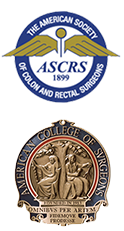Inflammatory Bowel Disease
Inflammatory Bowel Disease (IBD) refers to a group of conditions in which an abnormal immune response leads to chronic, relapsing inflammation of the gastrointestinal tract. Crohn’s Disease and Ulcerative Colitis are the two most common diseases in which this occurs. Although both diseases have similarities, it is important to distinguish between the two, because the appropriate surgical treatment, if needed, depends on accurately diagnosing which disease is causing the underlying inflammation. IBD is often confused with IBS (Irritable Bowel Syndrome) due to the similar names. IBS or “spastic colon” is not an inflammatory disorder but rather a disorder relating to bowel’s function, which may lead to either bouts of diarrhea or constipation. IBS can be differentiated from IBD by its lack of bowel inflammation and the two disease groups are not related and not treated in the same way.
Both Crohn’s Disease and Ulcerative Colitis share symptoms related to an over-amplification of the body’s immune response to various components (i.e. bacteria, food particles) that are normally present within the gastrointestinal tract. Normally, the immune system would investigate these agents and move on, but in people with IBD the immune system overreacts and mounts an attack against the underlying intestine. This leads to chronic inflammation and the resulting symptoms of IBD. The underlying cause of the diseases has yet to be fully explained but evidence points to a combination of factors, likely a genetic predisposition to the disease and certain environmental factors which interact to initiate and sustain the abnormal immune response.
What are the risk factors for development of IBD?
One of the original clues linking genetics to IBD lies in the clustering of the disease within families. Overall, 10-20% of affected individuals have other family members with IBD. Having a first-degree relative with IBD holds a 10-fold increased risk for developing the disease. Racial differences are also present. Highest rates are among Caucasian and Jewish people, particularly Ashkenazi Jews of European descent. Intense research has uncovered an inheritable genetic mutation (the NOD2/CARD15 gene) that is believed to be responsible for 15-30% of Crohn’s Disease. This is gene is known to be involved in the immune system’s defense against colonic bacteria.
Other factors support the importance of an environmental trigger in developing the disease. For instance, if an identical twin has IBD there is only a 50% chance that his/her sibling will develop the disease. If the disease was completely due to genetic inheritance, then the risk should be 100%. In addition, the number of people affected with IBD has risen by two- to ten-fold over the past two to three decades. This rate of increase also suggests an environmental factor, because it would require many decades for a purely inheritable (i.e. genetic) disease to rise by this amount. IBD is also much more common in urban areas where people spend the majority of their time indoors – researchers propose that the lack of childhood exposure to certain environmental factors (i.e. bacteria, allergens) may heighten the immune system’s risk of overreacting to these “antigens” later in life.
Summary:
Inflammatory Bowel Disease is a complex and, as of yet, not fully understood group of diseases which causes one’s own immune system to attack, inflame and damage the gastrointestinal tract. Both genetic susceptibility and environmental factors play important roles in their development and with further research will play a role in preventing and treating the disease.
The first step in treating IBD lies with properly diagnosing the illness and instituting the proper medical or surgical therapy to suppress or cure the disease. Our group is experienced in the diagnosis and treatment of IBD, working closely with a multidisciplinary team of specialists to offer you the best outcomes available. Please contact our office for consultation





